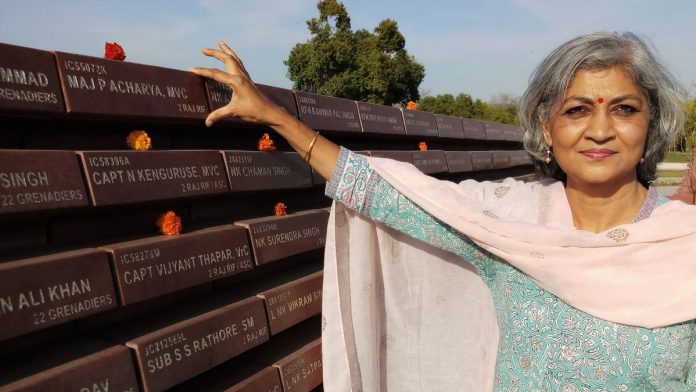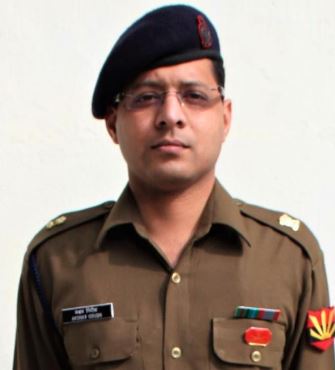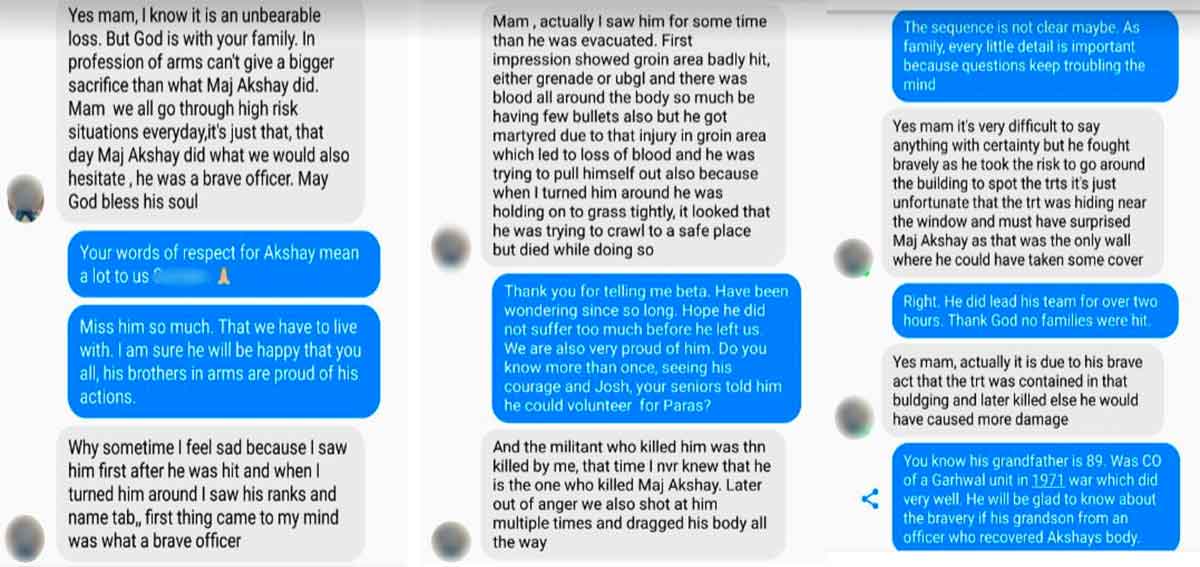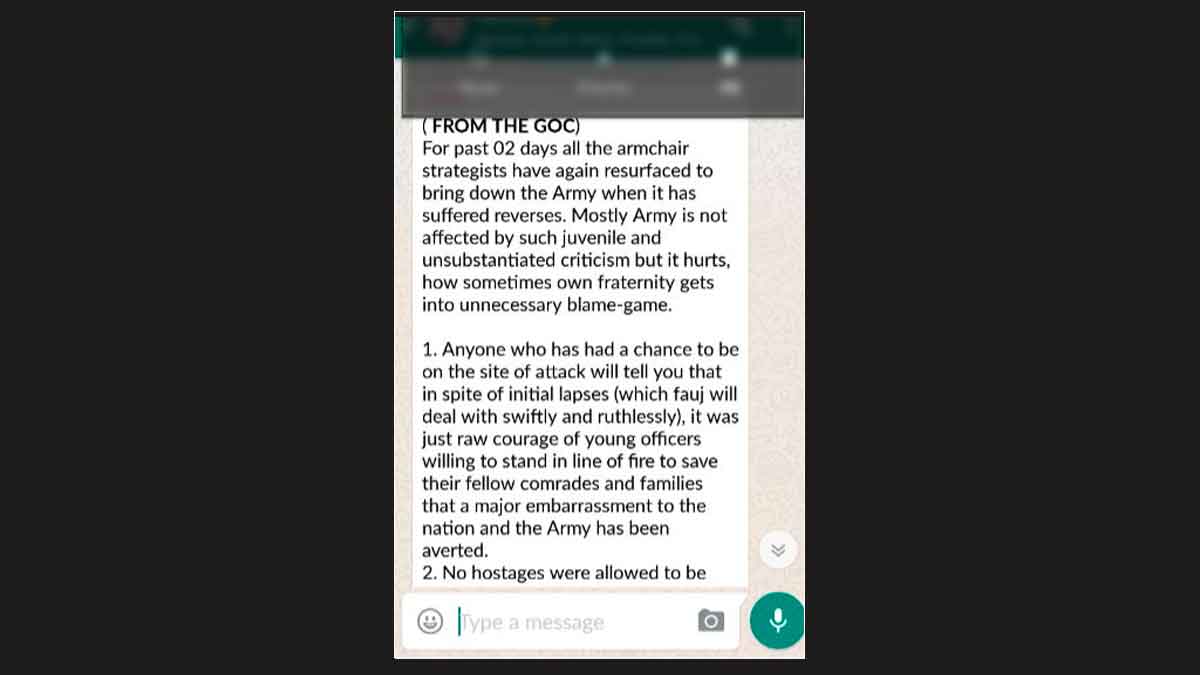Meghna Girish wants to know why a recommendation for Shaurya Chakra for her son Major Girish, killed in 2016 in J&K, was changed to an official report mentioning a soldier’s gallant action.

New Delhi: A soft-spoken social media-savvy mother is fighting for what she believes is the rightful “honour for her son”, and in the process, has turned the spotlight on the Army’s gallantry award procedure.
“An unsung hero is better than an insulted one,” said Meghna Girish, the mother of Major Akshay Girish, who was among seven soldiers killed in a terror attack on an Army camp in Nagrota, Jammu and Kashmir, in November 2016.

Stung by the Army naming her son under “Mention in Despatches (MID)” as opposed to awarding him the Shaurya Chakra — as recommended by his commanding officer for his “gallant action” — Meghna has been leading a campaign for Major Girish.
The Shaurya Chakra is the Army’s third highest peacetime decoration while an MID is just an official report mentioning a soldier’s gallant action in an attack. It is written by a senior officer and sent to the Army high command.
“I am not insisting on a gallantry award for Akshay,” Meghna told ThePrint. “What I am asking for is an explanation as to why my son did not get the Shaurya Chakra as recommended by his senior officers. I have not accepted the MID and it should be withdrawn because an unsung hero is better than an insulted hero.”

Her campaign has now received a major setback.
Army sources have told ThePrint that Major Girish’s family has been informed that a review committee, set up by Defence Minister Nirmala Sitharaman in January, has concluded that the MID award to the late Major cannot be upgraded or withdrawn.
Meghna had met Sitharaman, helped by BJP MP Rajeev Chandrasekhar, after which the minister had tweeted on 3 January, saying, “As assured by the Raksha Mantri, a Committee has been constituted with members, inter alia, as suggested by Meghna Girish to look into the supreme sacrifice made by her son Major Akshay Girish. Smt. Meghna Girish has been invited to depose before and assist the Committee”.
Meghna told ThePrint that on 25 March, she again wrote to Sitharaman reminding her of the committee.
“Elections are around the corner and while we hope to see our government back, you may or may not be our Raksha Mantri,” she wrote. “I appeal to you not to shatter the faith and trust reposed in you to resolve the long outstanding issue of due justice and honour to Major Akshay Girish. Please communicate your decision before 31st March 2019.”
The Major’s mother said on 30 March, an Army car stopped by her gate at 8 pm and some officers showed her a file. “The file just corroborates Akshay’s leadership, bravery and sacrifice to save lives. It neither referred to an award nor made a recommendation,” she said.
The Nagrota Attack
Just two months after the Army’s surgical strike in Pakistan-occupied Kashmir, Jaish-e-Mohammed terrorists, dressed in police uniforms, struck the Army’s 166 Field Regiment artillery unit in Nagrota on 29 November 2016. The unit comes under the 14 Corps.
On that day, Major Girish led a quick reaction team (QRT) at about 6.15 am to fight off three heavily-armed terrorists who had managed to sneak into the officer’s residential quarters by killing four soldiers at the entry gate. The families, which included children, were at risk.
According to the Major’s unit, 51 Engineers, he faced a hidden terrorist at close range. Despite being hit by multiple bullets, he returned fire for several minutes until a grenade, launched from a terrorist’s under-barrel grenade launcher, blew up his thighs.
His body was recovered only during combing operations late in the evening after the three terrorists had been killed.
Mother argues that CO recommended award
Meghna said the commanding officer of the 51 Engineers had initiated the note for the slain officer to be awarded the Shaurya Chakra.
“This was further endorsed by the GoC of the 14 Corps and by the Northern Army Commander,” she said. “But it got downgraded to the MID at the Army headquarters. Why?”
She has several messages from the Major’s peers, those of the special forces who led the operations and even senior officers, telling her how brave her son was.


Meghna further said that when she first met the Army chief, Gen. Bipin Rawat, in October 2017, he was very courteous and said he would look into the issue.
“When I met him again on 2 January 2018, he said that the citation written by the CO was not very strong. I agree that that the CO did not have battle experience and hence the citation could not have been very strong,” she said. “Even if the writing was not so strong, how come all of them, including the then Northern Commander, recommended him? What is the weight of all these officers then?”
Calling it a “systemic failure”, she now wants the procedure, for the grant of the gallantry awards, to be made more transparent so that the families of those killed “don’t have to go through this again”.
Army sources, however, told ThePrint that due diligence has been followed in the case. “From the first time he was awarded for the Nagrota operations to now, when the review committee looked into the whole issue, due diligence was followed,” a source said.
Asked about Meghna’s allegation that the Army was hesitant to award the Major with the Shaurya Chakra as the attack was an embarrassment for the force, the source added, “Major Kunal Gosavi was awarded Shaurya Chakra (posthumously) for the same operation. There is a proper mechanism in place for awards which has multiple checks and balances”.
The Army’s own Court of Inquiry into the terror attack is still on.
Also read: Not just Abhinandan’s story: Next time you cheer for soldiers, remember their families too
The process for gallantry awards
The Army follows a multi-tiered process in selecting personnel for a gallantry award.
The first note for a gallantry award is initiated by the commanding officer. This is then sent to the brigade headquarters, which then forwards it to the division headquarters with remarks.
From here, the file moves to the corps headquarters where it is processed by a board. The file eventually moves to the command headquarters where another board, consisting of four to five officers, reviews it.
“Only when the GoC-in-C of the command approves the board’s decision that the file is moved to the Army headquarters where another board consisting of the vice chief, the military secretary, the chief of military intelligence and others review it,” a source explained. “Their recommendation is sent to the Army chief who after his remarks sends it to the MoD for final approval.”
Asked if there is scope for improvement, former DGMO Lt Gen, Vinod Bhatia (retd) told ThePrint, “It is a proper system but there is no perfect system in the world.” He added that there are multiple checks and balances in place to ensure that the system works well.
Also read: PM Modi dedicates National War Memorial to India’s fallen soldiers after independence
Spike in gallantry awards
There has been a spike in gallantry awards over the recent years in comparison to earlier wars, such as the ones fought in 1965 and 1971.
The Army source, however, explained this by citing the duration of the wars.

“You will have to look at the duration of these wars,” the source said. “For example, the Kargil battle went on for three months and hence you will see a larger number of awards in comparison to earlier ones.”
“Also, the Indian Army is involved in day-to-day operations in a big way. And hence it would be completely wrong to compare today’s scenario with the earlier ones,” the source added.
Lt Gen Bhatia (retd) argued that awards are a motivation but underlined that laid down parameters have to be met.
“There is a certain yardstick that an act of gallantry has to fall within,” he said. “An award is a great motivation. A unit citation is also a great motivator. With Army involved in daily operations at the LoC and in Kashmir, the number of awards will naturally rise.”
